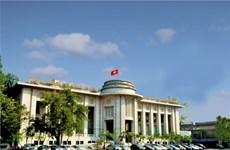Vietnam expects more promising export markets
Local businesses are expecting more opportunities to open up for export
in the near future as several free trade agreements (FTA) between
Vietnam and other countries are being negotiated.
In mid-October, the first session of a multi-national working party representing Vietnam, Russia, Belarus and Kazakhstan took place in Hanoi to prepare for the first researches on the impact of a free trade area between Vietnam and the Russia-Belarus-Kazakhstan customs alliance.
In mid-October, the first session of a multi-national working party representing Vietnam, Russia, Belarus and Kazakhstan took place in Hanoi to prepare for the first researches on the impact of a free trade area between Vietnam and the Russia-Belarus-Kazakhstan customs alliance.
Local businesses are expecting more opportunities to open up for export
in the near future as several free trade agreements (FTA) between
Vietnam and other countries are being negotiated.
In mid-October, the first session of a multi-national working party representing Vietnam, Russia, Belarus and Kazakhstan took place in Hanoi to prepare for the first researches on the impact of a free trade area between Vietnam and the Russia-Belarus-Kazakhstan customs alliance.
According to Dang Hoang Hai, Head of the European Market Department under the Ministry of Industry and Trade (MoIT), if a FTA is established, Vietnamese businesses will have more opportunity to trade in the Eastern European market as they do not face direct competition. In particular, agricultural products – a Vietnamese strongpoint – will get a better foothold in this market.
Also this month, the third round of negotiations on the trans-Pacific Partnership Agreement (TPP) was held in Brunei with eight countries taking part, including Singapore, Brunei, Australia, the US, New Zealand, Chile, Peru and Vietnam. The TPP is expected to stimulate growth for businesses that operate in the Asian-Pacific region, which is seen as one of the world’s most dynamic markets.
According to the President of the Vietnam Garments and Textiles Group (Vinatex) Le Quoc An, if Vietnam becomes a TPP member, garments manufacturers will have an enormous opportunity, especially in the US and South American markets. “Therefore, businesses are waiting expectantly for this agreement to be signed,” he said.
In addition, Vietnam is also actively preparing for FTA negotiations with Chile .
However, Vietnamese businesses are still weak in taking advantage of tariff preferences from FTA. They have failed to form alliances with regional businesses to make the most of tariff preferences and access to new technologies.
It is difficult for Vietnam to establish a new export market or find markets with large consumer demands, say experts, who emphasised the importance of taking advantage of tariff preferences in large markets such as Eastern Europe, the EU, the US, Japan, the Republic of Korea and India, who Vietnam will establish FTAs with.
They recommended that Vietnamese businesses should keep a close watch on FTA negotiations between Vietnam and the aforementioned partners to prepare to take advantage of these markets.
According to the MoIT, Vietnam, together with ASEAN, has to date signed and implemented FTAs with six major partners in East Asia, including the ASEAN-China Free Trade Agreement (ACFTA), the ASEAN-RoK Free Trade Agreement (AKFTA), the ASEAN-Japan Comprehensive Economic Partnership (AJCEP); the ASEAN-Indian Free Trade Agreement (AIFTA) and the ASEAN-Australia-New Zealand Free Trade Agreement (AANZFTA).
These agreements were valued as essential for Vietnam to increase its export turnover./.
In mid-October, the first session of a multi-national working party representing Vietnam, Russia, Belarus and Kazakhstan took place in Hanoi to prepare for the first researches on the impact of a free trade area between Vietnam and the Russia-Belarus-Kazakhstan customs alliance.
According to Dang Hoang Hai, Head of the European Market Department under the Ministry of Industry and Trade (MoIT), if a FTA is established, Vietnamese businesses will have more opportunity to trade in the Eastern European market as they do not face direct competition. In particular, agricultural products – a Vietnamese strongpoint – will get a better foothold in this market.
Also this month, the third round of negotiations on the trans-Pacific Partnership Agreement (TPP) was held in Brunei with eight countries taking part, including Singapore, Brunei, Australia, the US, New Zealand, Chile, Peru and Vietnam. The TPP is expected to stimulate growth for businesses that operate in the Asian-Pacific region, which is seen as one of the world’s most dynamic markets.
According to the President of the Vietnam Garments and Textiles Group (Vinatex) Le Quoc An, if Vietnam becomes a TPP member, garments manufacturers will have an enormous opportunity, especially in the US and South American markets. “Therefore, businesses are waiting expectantly for this agreement to be signed,” he said.
In addition, Vietnam is also actively preparing for FTA negotiations with Chile .
However, Vietnamese businesses are still weak in taking advantage of tariff preferences from FTA. They have failed to form alliances with regional businesses to make the most of tariff preferences and access to new technologies.
It is difficult for Vietnam to establish a new export market or find markets with large consumer demands, say experts, who emphasised the importance of taking advantage of tariff preferences in large markets such as Eastern Europe, the EU, the US, Japan, the Republic of Korea and India, who Vietnam will establish FTAs with.
They recommended that Vietnamese businesses should keep a close watch on FTA negotiations between Vietnam and the aforementioned partners to prepare to take advantage of these markets.
According to the MoIT, Vietnam, together with ASEAN, has to date signed and implemented FTAs with six major partners in East Asia, including the ASEAN-China Free Trade Agreement (ACFTA), the ASEAN-RoK Free Trade Agreement (AKFTA), the ASEAN-Japan Comprehensive Economic Partnership (AJCEP); the ASEAN-Indian Free Trade Agreement (AIFTA) and the ASEAN-Australia-New Zealand Free Trade Agreement (AANZFTA).
These agreements were valued as essential for Vietnam to increase its export turnover./.













